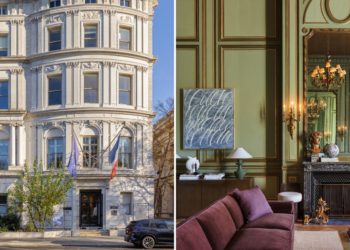When President Trump temporarily reduced tariffs this month on imports from China from the astronomical level that he had set in March, the stock market soared and economists said a recession was now less likely.
But the emergency is not over for small business owners like Carina Hamel and Robby Ringer who import products from China.
Ms. Hamel and Mr. Ringer’s company, Bivo, sells stainless steel water bottles with a patented nozzle that allows users — think, thirsty cyclists — to gulp drinks quickly. Before Mr. Trump’s tariffs threatened the company’s existence, the founders said, the nearly five-year-old business, run out of a former corset factory in Richmond, Vt., was growing fast and close to becoming profitable.
The drop in tariffs this month to 30 percent from 145 percent on most Chinese goods was a relief but in the way that a flood is better than a tsunami. “Six weeks ago, 30 percent would have shocked the world and been appalling and hard to deal with — and it is now,” Mr. Ringer said.
The duties on Bivo’s bottles are higher than 30 percent because of the material they’re made from and how they are classified by trade officials. Bivo bottles that are not insulated are subject to tariffs that add up to 47 percent, and the rate for insulated bottles is 37 percent.
Mr. Trump has frequently said that foreign businesses that ship products to the United States pay the tariffs. But, in reality, importers like Bivo pay the duties to the federal government when goods arrive at a U.S. port.
“It’s still a massive impact to the cash, and it still requires reworking a whole new strategy,” Mr. Ringer said.
Bivo now estimated sales to be 30 percent lower than it had previously expected, in large part because many retailers, which buy around two-thirds of its bottles, are buying less outdoor gear as they try to navigate their way through economic uncertainty.
Mr. Trump’s tariffs are weighing on businesses of all sizes. Walmart’s chief executive said this month that the giant retailer probably would not be able to “absorb all the pressure” from the tariffs.
Tariffs pose even bigger risks to small businesses. They typically don’t have the deep financial reserves needed to weather economic problems, the heft to demand lower prices from suppliers and the sway to lobby the government for exemptions from tariffs, said Ebehi Iyoha, an assistant professor at Harvard Business School.
“We should generally expect small businesses to be more vulnerable to trade shocks than large businesses,” Professor Iyoha said.
The National Federation of Independent Business, an association that represents small businesses, regularly surveys its members about how their businesses are doing. In April, its members’ expectations for future sales declined for the fourth month in a row. In a note accompanying the survey results, the federation said that millions of small businesses “acquire imported goods as inputs to their operations and those supply chains are currently at risk.”
The United States imported goods worth $439 billion from China last year, and many businesses — including Bivo — say they cannot get their products anywhere else any time soon.
Things might have been a lot worse for Ms. Hamel and Mr. Ringer, who are married and live a few doors from Bivo’s offices in Richmond, a trailhead town on the Winooski River.
Expecting strong demand for their bottles, they had imported roughly 50,000 from China days before Mr. Trump first imposed his tariffs this year. “Dumb luck,” Mr. Ringer said.
But when tariffs climbed to 145 percent, Bivo had to effectively stop importing because it did not have the cash to pay the duties. But it had committed to buying 30,000 more bottles from Haers, its supplier in Yongkang, China.
Ms. Hamel, Mr. Ringer and their six full-time employees snapped into survival mode.
Ms. Hamel went to Europe to see if the company could sell its bottles there, but she realized it would take too long to quickly sell many bottles there. During the trip, Ms. Hamel was at her lowest point since the tariffs were introduced. “I still feel super optimistic we can make it through this,” she said from England, “but I think it’s going to be really freaking hard.”
She did make some inroads. A German outdoor gear retailer said it would start selling Bivo’s bottles, and Ms. Hamel found a warehouse in the Netherlands where the company could ship its bottles from China for distribution in Europe.
After Ms. Hamel returned home, Mr. Ringer went to China to plead for better terms from Haers. Though the supplier would not cut the cost of the bottles, it did give Mr. Ringer more time to pay for them, offering Bivo some financial breathing room.
Haers did not respond to a request for comment.
When he was in China, Mr. Ringer asked to see Bivo’s products in the warehouse, which is something he has done before to check manufacturing quality. But this time, he had to clamber over pallets in the aisles to see the bottles. The warehouse was crammed full of goods that customers had delayed shipping to avoid paying the 145 percent tariffs.
On May 12, when Mr. Trump reduced tariffs on China for 90 days, Ms. Hamel and Mr. Ringer concluded that they could now afford to pay the tariffs on a small shipment — 7,624 of the 30,000 bottles they had promised to buy. They will pay $24,436 in duties on the shipment, compared with an estimated $3,645 at the rates that existed before Mr. Trump took office, according to their calculations.
Ms. Hamel and Mr. Ringer said they were not planning to increase prices on the bottles, which sell for $34 to $54. Bivo pays roughly $8 per bottle, before tariffs, and sells them to wholesalers for around $20.
Critics of tariffs say they hurt entrepreneurs like Ms. Hamel and Mr. Ringer. The two had come up with the idea for a stainless-steel bottle for athletes in 2019 while cross-country skiing on Mount Hood in Oregon, after noticing most sports water bottles were invariably plastic. They have put $500,000 in personal savings into Bivo and used their house as collateral for a line of credit for the business.
Supporters of the tariffs, however, say China has subsidized many industries, including steel and aluminum mills, giving the country’s manufacturers an unfair advantage over businesses elsewhere. Mr. Trump and his aides have exhorted American businesses to move production to the United States.
Bivo has considered making bottles in the United States but determined that would push up the cost of manufacturing to at least $50 each. Ms. Hamel and Mr. Ringer said that, without significant government support, many businesses would not be able to shift production to the United States.
“It’s not laid out to set up U.S. manufacturing,” Mr. Ringer said about Mr. Trump’s tariff policy. “It is only laid out to, in theory, punish China, when it’s really also punishing U.S. businesses.”
Peter Eavis reports on the business of moving stuff around the world.
The post A Vermont Start-Up Was Close to Becoming Profitable. Then the Tariffs Hit. appeared first on New York Times.




